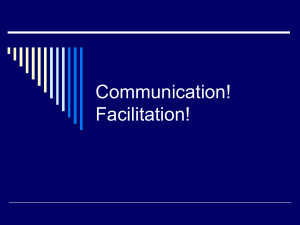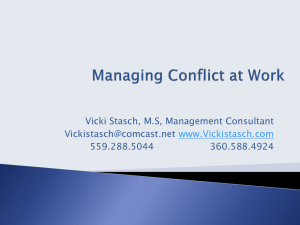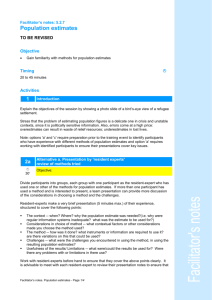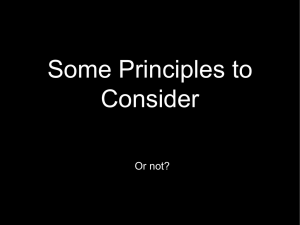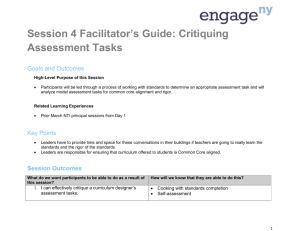FACILITATING THE PROBLEM SOLVING PROCESS
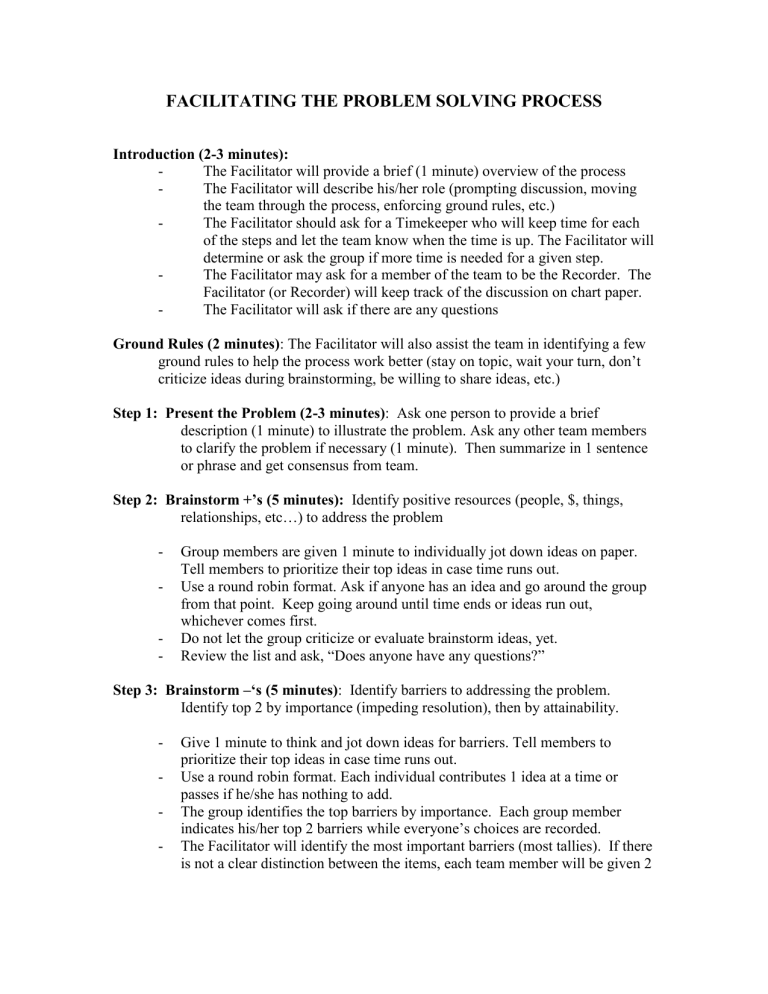
FACILITATING THE PROBLEM SOLVING PROCESS
Introduction (2-3 minutes):
-
-
The Facilitator will provide a brief (1 minute) overview of the process
The Facilitator will describe his/her role (prompting discussion, moving
the team through the process, enforcing ground rules, etc.)
The Facilitator should ask for a Timekeeper who will keep time for each of the steps and let the team know when the time is up. The Facilitator will
determine or ask the group if more time is needed for a given step.
The Facilitator may ask for a member of the team to be the Recorder. The
-
Facilitator (or Recorder) will keep track of the discussion on chart paper.
The Facilitator will ask if there are any questions
Ground Rules (2 minutes) : The Facilitator will also assist the team in identifying a few ground rules to help the process work better (stay on topic, wait your turn, don’t criticize ideas during brainstorming, be willing to share ideas, etc.)
Step 1: Present the Problem (2-3 minutes) : Ask one person to provide a brief description (1 minute) to illustrate the problem. Ask any other team members to clarify the problem if necessary (1 minute). Then summarize in 1 sentence or phrase and get consensus from team.
Step 2: Brainstorm +’s (5 minutes):
Identify positive resources (people, $, things, relationships, etc…) to address the problem
Group members are given 1 minute to individually jot down ideas on paper.
Tell members to prioritize their top ideas in case time runs out.
Use a round robin format. Ask if anyone has an idea and go around the group from that point. Keep going around until time ends or ideas run out, whichever comes first.
Do not let the group criticize or evaluate brainstorm ideas, yet.
-
Review the list and ask, “Does anyone have any questions?”
Step 3: Brainstorm –‘s (5 minutes) : Identify barriers to addressing the problem.
Identify top 2 by importance (impeding resolution), then by attainability.
Give 1 minute to think and jot down ideas for barriers. Tell members to prioritize their top ideas in case time runs out.
Use a round robin format. Each individual contributes 1 idea at a time or passes if he/she has nothing to add.
The group identifies the top barriers by importance. Each group member indicates his/her top 2 barriers while everyone’s choices are recorded.
The Facilitator will identify the most important barriers (most tallies). If there is not a clear distinction between the items, each team member will be given 2
more votes to identify items that are most important (in addition to their first two choices).
The group then decides to brainstorm strategies based on the items that are the most attainable.
Step 4: Brainstorm Strategies (6-8 minutes) : Brainstorm strategies to overcome top barriers identified. Remember to capitalize on the positives.
Give 1 minute to think and jot down ideas for strategies. Tell members to prioritize their top ideas in case time runs out.
Use a round robin format
Remind members that this is NOT a time for commenting on suggestions.
You don’t have to agree with the strategy, but everyone’s ideas are put on paper.
Step 5: Dialogue (6-8 minutes) : Dialogue clarification of strategies. Use an open forum.
The Facilitator makes sure that all group members understand the strategies that have been suggested. Group members ask questions if they do not understand any of the listed strategies.
This IS the time for clarification, commentary or evaluation.
Step 6: Resolution (6-8minutes) : Select top strategies and develop action steps (who, what, & when).
The group prioritizes the list of strategies by importance and the most attainable. Each group member indicates his/her top 2 choices.
The Facilitator will identify the most important strategies (most tallies). If there is not a clear distinction between the items, each team member will be given 2 more votes to identify strategies that are most important (in addition to their first two choices).
Give the group 1 minute to think and jot down ideas for putting the selected strategies into action.
The facilitator guides the team through an action plan for the selected strategy.
Use an open forum to discuss action steps.
-
When discussing the “what” provide clarification, may require some discussion, but keep it brief.
Always include evaluation as an action step to check and see how things are working.
Conclusion:
The group will identify someone to summarize the outcomes of the discussion including detailed action steps in a format for distribution to the team.)


